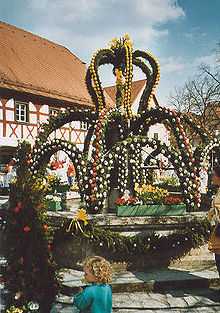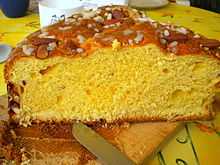Easter customs

Since its origins, Easter has been a time of celebration and feasting and many Traditional Easter games and customs developed, such as egg rolling, egg tapping, Pace egging and egg decorating. Today Easter is commercially important, seeing wide sales of greeting cards and confectionery such as chocolate Easter eggs, marshmallow bunnies, Peeps, and jelly beans. Even many non-Christians celebrate these aspects of the holiday while eschewing the religious aspects.
Customs around the world
Cyprus
As well as the common painted easter egg bump, in Cyprus it is customary for people to light great fires[1] (Greek: λαμπρατζια) in schools or church yards. The fires are made up of scrap wood, gathered usually by over-enthusiastic young boys which scour their neighborhoods for them, in order to make their fire as great as it can be (and bigger than the neighboring one). More than often this competition leads to fights happening over scraps of wood and the police or fire department being called to put out the fires that have gone out of control. It is customary for a small doll representing Judas Iscariot to be burnt.
Central and Eastern Europe
Many central and eastern European ethnic groups, including the Albanians, Armenians, Belarusians, Bulgarians, Croats, Czechs, Georgians, Germans, Hungarians, Latvians Lithuanians, Macedonians, Poles, Romanians, Russians, Serbs, Slovaks, Slovenes, and Ukrainians decorate eggs for Easter.
In Bulgaria the Easter eggs are decorated on Thursday before Easter or at Saturday before Easter. Widespread tradition is to fight with eggs by pair and one's egg become last surviving is called borak (Bulgarian: борак, fighter). The tradition is to display the decorated eggs on the Easter table together with the Easter dinner consisting of roasted lamb, a salad called Easter salad (lettuce with cucumbers) and a sweet bread called kozunak.
In the Czech Republic and Slovakia, a tradition of spanking or whipping is carried out on Easter Monday. In the morning, men spank women with a special handmade whip called a pomlázka (in Czech) or korbáč (in Slovak), or, in eastern Moravia and Slovakia, throw cold water on them. The pomlázka/korbáč consists of eight, twelve or even twenty-four withies (willow rods), is usually from half a meter to two meters long and decorated with coloured ribbons at the end. The spanking is not painful or intended to cause suffering. A legend says that women should be spanked with a whip in order to keep their health and beauty during the whole next year.[2]
An additional purpose can be for men to exhibit their attraction to women; unvisited women can even feel offended. Traditionally, the spanked woman gives a coloured egg and sometimes a small amount of money to the man as a sign of her thanks. In some regions, the women can get revenge in the afternoon or the following day when they can pour a bucket of cold water on any man. The habit slightly varies across Slovakia and the Czech Republic. A similar tradition existed in Poland (where it is called Dyngus Day), but it is now little more than an all-day water fight.

In Germany, decorated eggs are hung on branches of bushes and trees to make them Easter egg trees. Eggs also used to dress wells for Easter, the Osterbrunnen, most prominently in the Fränkische Schweiz (Franconian Switzerland).[3]
In Bosnia and Herzegovina, Croatia and Slovenia, a basket of food is prepared and covered with a handmade cloth, and brought to the church to be blessed. A typical Easter basket includes bread, colored eggs, ham, horseradish, and a type of nut cake called "potica".[4]
The butter lamb (Baranek wielkanocny) is a traditional addition to the Easter Meal for many Polish Catholics. Butter is shaped into a lamb either by hand or in a lamb-shaped mould.
In Hungary, Transylvania, Southern Slovakia, Kárpátalja, Northern Serbia - Vojvodina and other territories with Hungarian-speaking communities, the day following Easter is called Locsoló Hétfő, "Watering Monday". Men usually visit families with girls and women. Water, perfume or perfumed water is sprinkled on the women and girls of the house by the visiting men, who are given in exchange an Easter egg.
In Poland, white sausage and mazurek are typical Easter breakfast dishes.
English-speaking world

Throughout the English-speaking world, many Easter traditions are similar with only minor differences. For example, Saturday is traditionally spent decorating Easter eggs and hunting for them with children on Sunday morning, by which time they have been mysteriously hidden all over the house and garden. Other traditions involve parents telling their children that eggs and other treats such as chocolate eggs or rabbits, and marshmallow chicks (Peeps), have been delivered by the Easter Bunny in an Easter basket, which children find waiting for them when they wake up. Many families observe the religious aspects of Easter by attending Sunday Mass or services in the morning and then participating in a feast or party in the afternoon. Some families have a traditional Sunday roast, often of either roast lamb or ham. Easter breads such as Simnel cake, a fruit cake with eleven marzipan balls representing the eleven faithful apostles, or nut breads such as potica are traditionally served. Hot cross buns, spiced buns with a cross on top, are traditionally associated with Good Friday, but today are often eaten well before and after.
In Scotland, the north of England, and Northern Ireland, the traditions of rolling decorated eggs down steep hills and pace egging are still adhered to.
In New Zealand, the Auckland Easter Show is an annual tradition.
In Louisiana, USA, egg tapping is known as egg knocking. Marksville, Louisiana claims to host the oldest egg-knocking competition in the US, dating back to the 1950s. Competitors pair up on the steps of the courthouse on Easter Sunday and knock the tips of two eggs together. If the shell of your egg cracks you have to forfeit it, a process that continues until just one egg remains.[5]
In the British Overseas Territory of Bermuda, historically famous for growing and exporting the Easter lily, the most notable feature of the Easter celebration is the flying of kites to symbolize Christ's ascent.[6] Traditional Bermuda kites are constructed by Bermudians of all ages as Easter approaches, and are normally only flown at Easter. In addition to hot cross buns and Easter eggs, fish cakes are traditionally eaten in Bermuda at this time.
In Jamaica, eating bun and cheese is a highly anticipated custom by Jamaican nationals all over the world. The Jamaica Easter Buns are spiced and have raisins, and baked in a loaf tin. The buns are sliced and eaten with a slice of cheese. It is a common practice for employers to make gifts of bun and cheese or a single loaf of bun to staff members. According to the Jamaica Gleaner, "The basic Easter bun recipe requires wheat flour, brown sugar, molasses, baking powder or yeast and dried fruits." http://jamaica-gleaner.com/gleaner/20130327/health/health3.html . Easter egg traditions and the Easter Bunny activities are not widespread in Jamaica.
Italy

In Florence, Italy, the unique custom of the Scoppio del carro is observed in which a holy fire lit from stone shards from the Holy Sepulchre are used to light a fire during the singing of the Gloria of the Easter Sunday mass, which is used to ignite a rocket in the form of a dove, representing peace and the holy spirit, which following a wire in turn lights a cart containing pyrotechnics in the small square before the Cathedral.[citation needed]
The Netherlands, Belgium and France
Church bells are silent as a sign of mourning for one or more days before Easter in The Netherlands, Belgium and France. This has led to an Easter tradition that says the bells fly out of their steeples to go to Rome (explaining their silence), and return on Easter morning bringing both colored eggs and hollow chocolate shaped like eggs or rabbits.
In both The Netherlands and Flemish-speaking Belgium many of more modern traditions exist alongside the Easter Bell story. The bells ("de Paasklokken") leave for Rome on Holy Saturday, called "Stille Zaterdag" (literally "Silent Saturday") in Dutch.
In French-speaking Belgium and France the same story of Easter Bells (« les cloches de Pâques ») bringing eggs from Rome is told, but church bells are silent beginning Maundy Thursday, the first day of the Paschal Triduum.
Netherlands and Northern Germany

In the northern and eastern parts of the Netherlands (Twente and Achterhoek), Easter Fires (in Dutch: "Paasvuur") are lit on Easter Day at sunset. Easter Fires also take place on the same day in large portions of Northern Germany ("Osterfeuer").
Nordic countries
In Norway, in addition to staying at mountain cabins, cross-country skiing and painting eggs, a contemporary tradition is to read or watch murder mysteries at Easter. All the major television channels run crime and detective stories (such as Agatha Christie's Poirot), magazines print stories where the readers can try to figure out "Whodunnit", and new detective novels are scheduled for publishing before Easter. Even the milk cartons are altered for a couple of weeks. Each Easter a new short mystery story is printed on their sides. Stores and businesses close for five straight days at Easter, with the exception of grocery stores, which re-open for a single day on the Saturday before Easter Sunday.
In Finland, Sweden and Denmark, traditions include egg painting and small children dressed as witches collecting candy door-to-door, in exchange for decorated pussy willows. This is a result of the mixing of an old Orthodox tradition (blessing houses with willow branches) and the Scandinavian Easter witch tradition.[7] Brightly coloured feathers and little decorations are also attached to birch branches in a vase. In Finland, it is common to plant rye grass in a pot as a symbol of spring and new life. After the grass has grown, many people put chick decorations on it. Children busy themselves painting eggs and making paper bunnies.
For lunch or dinner on Holy Saturday, families in Sweden and Denmark traditionally feast on a smörgåsbord of herring, salmon, potatoes, eggs, and other kinds of food. In Finland, it is common to eat roasted lamb with potatoes and other vegetables. In Finland, the Lutheran majority enjoys mämmi as another traditional Easter treat, while the Orthodox minority's traditions include eating pasha (also spelled paskha) instead.
In the western parts of Sweden, bonfires have at least since the 18th century been lit during Holy Saturday. This tradition is claimed to have its origin in Holland. During the last decades though, the bonfires have in many places been moved to Walpurgis Night, as this is the traditional date for bonfires in many other parts of the country.
See also
References
- ↑ Pantopiou, Nicholas (April 4, 2010). "Lambratzia". Sigma Live. Retrieved April 11, 2011.
- ↑ Kirby, Terry (April 6, 2007). "The Big Question: Why do we celebrate Easter, and where did the bunny come from?". The Independent. Retrieved March 18, 2008.
- ↑ "Easter in Germany". Journey to Germany. Retrieved 8 April 2012.
- ↑ Slovenia's Easter Celebrations InCentralEurope.Radio.cz
- ↑ Easter Traditions: from the barmy to the beautiful The Times, London, 2009.
- ↑ Chello.nl, Bermuda Kite History.
- ↑ Geographia.com accessed March 22, 2008.